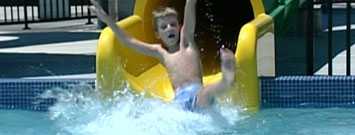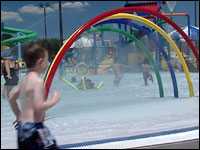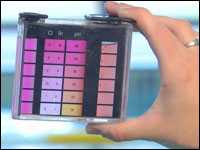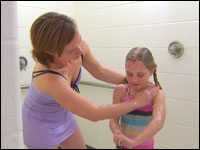Recreational Water Illness Awareness Week, May 18-24, 2009
 Memorial Day is around the corner and millions of kids and adults are looking forward to the beginning of the summer swim season. Swimming is a fun physical activity with many health benefits, but, remember, healthy swimming is no accident. Learn how you can prevent recreational water illnesses and injuries.
Memorial Day is around the corner and millions of kids and adults are looking forward to the beginning of the summer swim season. Swimming is a fun physical activity with many health benefits, but, remember, healthy swimming is no accident. Learn how you can prevent recreational water illnesses and injuries.
 The week of May 18–24, 2009 marks the fifth annual National Recreational Water Illness Prevention Week. This yearly observance is an opportunity for everyone to learn more about healthy swimming behaviors and other steps to prevent recreational water illnesses (RWIs) and injuries. RWIs are illnesses spread by swallowing, breathing in the vapors from, or having contact with contaminated water in swimming pools, water parks, spas, interactive fountains, ponds, lakes, rivers, or oceans. Injuries at aquatics facilities can occur in or out of the water.
The week of May 18–24, 2009 marks the fifth annual National Recreational Water Illness Prevention Week. This yearly observance is an opportunity for everyone to learn more about healthy swimming behaviors and other steps to prevent recreational water illnesses (RWIs) and injuries. RWIs are illnesses spread by swallowing, breathing in the vapors from, or having contact with contaminated water in swimming pools, water parks, spas, interactive fountains, ponds, lakes, rivers, or oceans. Injuries at aquatics facilities can occur in or out of the water.
This Year's RWI Prevention Week Theme: Preventing Pool Chemical Injuries
The theme for this year's RWI Prevention Week focuses on injuries associated with pool chemicals. Pool chemicals make the water we swim in safer by protecting us from germs; however, these same chemicals can also cause injuries if they are not stored and handled safely. These preventable injuries lead to thousands of emergency department visits each year. People can be injured by inhaling fumes when opening pool chemical containers, attempting to pre-dissolve pool chemicals, or handling them improperly. People can also be injured when chemicals splash into the eyes. Public pool operators and residential pool owners can protect themselves and others by taking these key steps:

Pool chemicals help ensure that the water is safe to swim in.
- ALWAYS secure pool chemicals away from children and animals
- ALWAYS read product label and manufacturer's directions before each use
- ALWAYS use appropriate protective gear, such as safety glasses and gloves, when handling pool chemicals
- NEVER mix chlorine products with each other, with acid, or with any other substance
To learn more about how you can prevent pool chemical–associated injuries, check out CDC's complete list of recommendations.
To learn more about pool chemical–associated injuries, check out CDC's report, "Pool chemical-associated health events in U.S. public and residential settings – United States, 1983-2007."
Keep Germs Out of the Pool

Parents can help ensure kids are clean before getting into the pool.
The best way to prevent RWIs is to keep germs out of the pool in the first place. Everyone can help create healthy swimming experiences this summer by following these six healthy swimming steps:
- PLEASE don't swim when you have diarrhea.
- PLEASE don't swallow pool water.
- PLEASE practice good hygiene. Shower with soap before swimming and wash your hands after using the toilet or changing diapers.
- PLEASE take your kids on bathroom breaks or check diapers often.
- PLEASE change diapers in a bathroom or a diaper-changing area and not at poolside.
- PLEASE wash your children thoroughly (especially the rear end) with soap and water before they go swimming.
NEW Healthy Swimming Resources

New CDC-TV video uses humor to describe healthy swimming behaviors.
To help get the message out about healthy swimming, CDC has developed new brochures and videos just in time for the 2009 summer swim season.
- The Healthy Swimming brochures are available in English and Spanish.
- The new "In the Swim of Things," 3-plus-minute video in the CDC-TV series "Health Matters," is a fun-filled reminder to play it safe and stay out of the water when you have diarrhea. An accompanying 30-second video is also available.
Other Healthy Swimming Resources
Download or listen to 3 podcasts on healthy swimming behaviors.
For in-depth information on Healthy Swimming, go to the Healthy Swimming Web site.
For information on safe swimming at beaches, see The Environmental Protection Agency's beaches Web site.
Think Healthy. Be Healthy. Swim Healthy!
Get email updates
To receive email updates about this page, enter your email address:
Contact Us:
- Centers for Disease Control and Prevention
1600 Clifton Rd
Atlanta, GA 30333 - 800-CDC-INFO
(800-232-4636)
TTY: (888) 232-6348 - Contact CDC–INFO
 ShareCompartir
ShareCompartir


